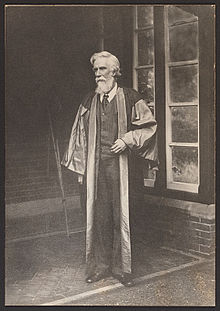- A. V. Dicey
-
Albert Venn Dicey 
Born 4 February 1835 Died 7 April 1922 Occupation Jurist, professor Known for Authority on the Constitution of the United Kingdom Albert Venn Dicey (4 February 1835 – 7 April 1922) was a British jurist and constitutional theorist, who wrote An Introduction to the Study of the Law of the Constitution (1885), and younger brother of Edward Dicey. The principles it expounds are considered part of the uncodified British constitution. He was a graduate of Balliol College, Oxford, and became Vinerian Professor of English Law at Oxford and a leading constitutional scholar of his day. Dicey popularised the phrase "rule of law",[1] although its use goes back to the 17th century.
Contents
Biography
His father was Thomas Edward Dicey, senior wrangler in 1811 and proprietor of the Northampton Mercury and Chairman of the Midland Railway. His brother was Edward James Stephen Dicey[2].
He became a lawyer in 1863 and was appointed to the Vinerian Chair of English Law at Oxford in 1882. In his first major work, the seminal An Introduction to the Study of the Law of the Constitution he outlined the principles of parliamentary sovereignty for which he is most known. In the book, he defined the term "constitutional law" as including "all rules which directly or indirectly affect the distribution or the exercise of the sovereign power in the state"[3]. He understood that the freedom British subjects enjoyed was dependent on the sovereignty of Parliament, the impartiality of the courts free from governmental interference and the supremacy of the common law.
He later left Oxford and went on to become one of the first Professors of Law at the then new London School of Economics. There he published in 1896 his Conflict of Laws.
As extensively shown in the work of Professor Matt Qvortrup, A.V. Dicey was also one of the first supporters of the use of referendums in the United Kingdom despite his views on parliamentary supremacy.
Political position
Dicey was a Liberal Unionist and a vigorous opponent of Home Rule and published and spoke against it extensively from 1886 until shortly before his death, advocating that no concessions be made to Irish nationalism in relation to the government of any part of Ireland as an integral part of the United Kingdom.[4] He was thus bitterly disillusioned by the agreement in 1921 that Southern Ireland should become a self-governing dominion (the Irish Free State), separate from the United Kingdom.
Dicey was also vehemently opposed to women's suffrage, proportional representation (whilst acknowledging that the existing first-past-the-post system was not perfect), and to the notion that citizens have the right to ignore unjust laws. Dicey viewed the necessity of establishing a stable legal system as more important than the potential injustice that would occur from following unjust laws. In spite of this, he did concede that there were circumstances in which it would be appropriate to resort to an armed rebellion but stated that such occasions most extremely rare.[5]
Bibliography
- Introduction to the Study of the Law of the Constitution (8th Edition with new Introduction) (1915)
- A Leap in the Dark, or Our New Constitution (an examination of the leading principles of the Home Rule Bill of 1893) (1893)
- England's Case against Home Rule (1887)
- The Privy Council: The Arnold Prize Essay (1887)
- A Digest of the Law of England with reference to the Conflict of Laws (2nd Edition) (1908)
- A Fool's Paradise: Being a Constitutionalist's Criticism of the Home Rule Bill of 1912 (1913)
- Lectures on the relation between law and public opinion in England during the nineteenth century (2nd Edition) (1914).
- Thoughts on the Union between England and Scotland (1920)
Biographies
- Cosgrove, Richard A. (1980). The Rule of Law: Albert Venn Dicey, Victorian jurist. London: Macmillan. pp. xv, 319p.
- Ford, Trowbridge H. (1985). Albert Venn Dicey: The Man and His Times. Chichester: Rose. pp. 354p.
References
- ^ Bingham, Thomas. The Rule of Law, page 3 (Penguin 2010). See Dicey's An Introduction to the Study of the Law of the Constitution, p. 173.
- ^ Neale, Charles Montague (1907). The senior wranglers of the University of Cambridge, from 1748 to 1907. With biographical, & c., notes. Bury St. Edmunds: Groom and Son. p. 28. http://www.archive.org/stream/senoirwranglerso00nealrich#page/28/mode/2up. Retrieved 2011-03-04.
- ^ Williams, George (2010). Australian Constitutional Law and Theory. The Federation Press. p. 2.
- ^ Speech of Professor Dicey, at the Liberal Unionists' meeting, in the Music Hall, Birkenhead, December 10, 1887.
- ^ "A. V. Dicey: Law of the Constitution". archive.org. http://www.archive.org/details/introductiontos04dicegoog. Retrieved 2011-04-12.
Academic offices Preceded by
John Robert KenyonVinerian Professor of English Law
1882—1909Succeeded by
William Martin GeldartCategories:- 1835 births
- British legal professionals
- People educated at King's College School, Wimbledon
- Constitutional law
- 1922 deaths
- English legal scholars
- English constitutionalists
- Alumni of Balliol College, Oxford
- Statutory Professors of the University of Oxford
- Academics of the London School of Economics
Wikimedia Foundation. 2010.
